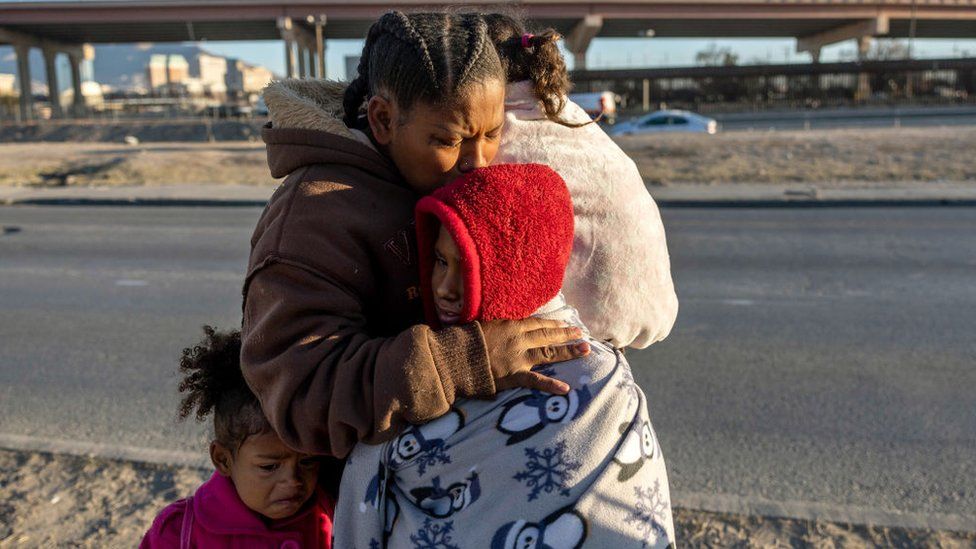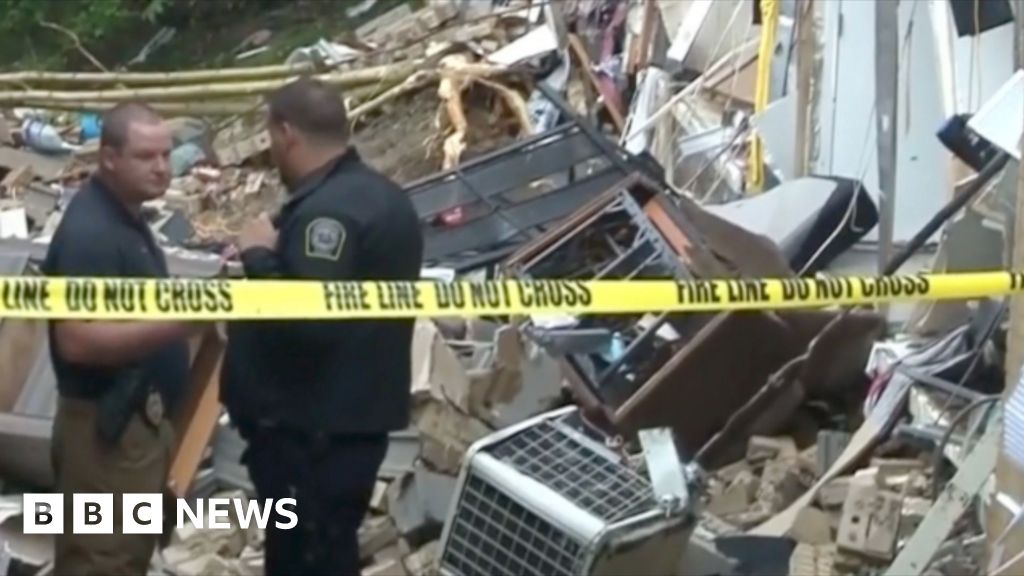ARTICLE AD BOX
 Image source, Getty Images
Image source, Getty Images
Officials say El Paso is at a breaking point
By Bernd Debusmann Jr
in El Paso, Texas
The Texas border city of El Paso is grappling with a mounting humanitarian crisis as a Trump-era policy hangs in the balance, leaving many migrants unsheltered in the cold night.
Title 42 gives the government the power to automatically expel undocumented migrants.
It has blocked thousands of people from crossing the US-Mexico frontier.
The policy was due to expire on 21 December, but has won a temporary reprieve from the Supreme Court.
On Monday Chief Justice John Roberts temporarily blocked its termination pending a ruling on an emergency appeal from some Republican-led states who have asked for the policy to remain in place.
The court's intervention, however, has meant little on the streets of El Paso, where shelters and humanitarian services have already been overburdened and weary migrants left sleeping rough in bitterly cold nights.
In central El Paso early on Tuesday afternoon, dozens of migrants were at the city's main Greyhound bus terminal, including women and young children sleeping on the pavement. While the majority were Nicaraguan and Venezuelan, citizens of countries throughout Latin America were present as well.
The experience of Dylan Torres Reyes, a 21-year-old Venezuelan, is typical of many of the migrants in El Paso.
After an arduous two-and-a-half month trip across South and Central America - in which he faced deadly jungles, corrupt police officers and racist treatment - he's spent three nights sleeping on the ground near the bus terminal, after one night when he was able to find room at a shelter.
He hopes to get to Chicago, where he has relatives.
"I've got no idea how I'm going to get there. I'm trying to get bus tickets, but I don't know how we'll get them," he told the BBC at a nearby park. "But I'm happy to be here. The treatment here has been excellent - it's just been very, very cold."
While city officials say they are doing their best to help house and transport migrants released from Customs and Border Patrol (CBP) each day, swelling numbers have strained resources. In the week ending 18 December alone, more than 10,300 migrants were released into the city, up from about 8,000 the week before.
Dylan Torres Reyes has spent three days sleeping rough
If Title 42 were to be lifted, federal and local officials have estimated that the number of daily migrant detentions would rise from 1,500 to between 4,000 and 6,000 - a figure that the city would be unable to handle with existing resources.
"It's not manageable. The shelters and community efforts have been overwhelmed," Fernando Garcia, executive director of the Border Network for Human Rights, told the BBC. "We have a problem, right now."
"We can't wait to see whether Title 42 ends or not," he added. "Right here, right now, we've got people in El Paso, on the streets. Children, women, with no winter clothing, No food, no water and no money to be transported to relatives."
State of emergency
On Sunday, El Paso Mayor Oscar Leeser, a Democrat, declared a seven-day state of emergency, which he said would give local authorities the resources to deal with an influx of migrants sleeping on the city's streets.
"We wanted to make sure people are treated with dignity," he told reporters. "We want to make sure everyone is safe."
Watch: What US border policy shift means for migrants
On Monday, Mr Leeser warned that the city's shelters were already at capacity, with an estimated 20,000 more migrants across the border prepared to cross into the US.
Vowing to be "prepared for whatever is coming through", Mr Leeser said that city officials are still preparing emergency plans, including converting large buildings into makeshift shelters and chartering buses to help transport migrants to other cities in Texas.
Much of the day-to-day work of helping the migrants, however, has fallen on a handful of NGOs and activist groups.
One such organisation - the El Pasoans Fighting Hunger Food Bank - has been feeding dozens of migrants at a time at locations throughout the city.
"This is absolutely a humanitarian crisis," chief executive Susan Goodell said. "The number of migrants in our community is amazing. I have never seen numbers like this."
This food bank is feeding hundred of migrants a day
While Ms Goodell said that her organisation has so far managed to cope with the number of migrants, it is struggling to keep up and has had to ask organisations in other parts of the US for help.
A helping hand from neighbours
Some residents of El Paso's downtown and the surrounding areas told the BBC that the influx of migrants has been inescapable in recent days: some described constant noise at night, crowded bus stations or leaving their house in the morning to find people sleeping next to their vehicles or homes.
Many residents of the area - in which nearly a quarter of the population is foreign-born - expressed sympathy for the plight of the migrants.
"They're just trying to better their lives. If you were in their position, you'd want to come to the United States for freedom, or employment," said Mark Casavantes, a lifelong resident of El Paso who lives just blocks from the Mexican border. "They're very peaceful people, and respectful. They haven't really caused problems."
Watch: Migrants feeling anxious as US border restrictions remain
Sue Dickson, a volunteer at Annunciation House - an organisation that offers shelter to migrants in El Paso - said that "more people's minds would be opened" if they saw the day-to-day realities of the migrant situation in this city.
"These are people who are desperate, who need asylum, who need to escape from violence and political oppression," she said. "They're coming here for safety."
'Very nervous'
Federal officials have repeatedly said that the government - particularly the Department of Homeland Security - is making preparations for the potential lifting of Title 42.
Humanitarian workers in El Paso, for their part, are split on whether lifting Title 42 will lead to the sudden spike predicted by some politicians - with many noting that any dramatic mass crossings would be an anomaly.
Still, the potential for further spikes has left many anxious.
"The numbers being predicted make us very nervous," Ms Goodell said. "We're preparing as best we can."

 2 years ago
38
2 years ago
38








 English (US) ·
English (US) ·